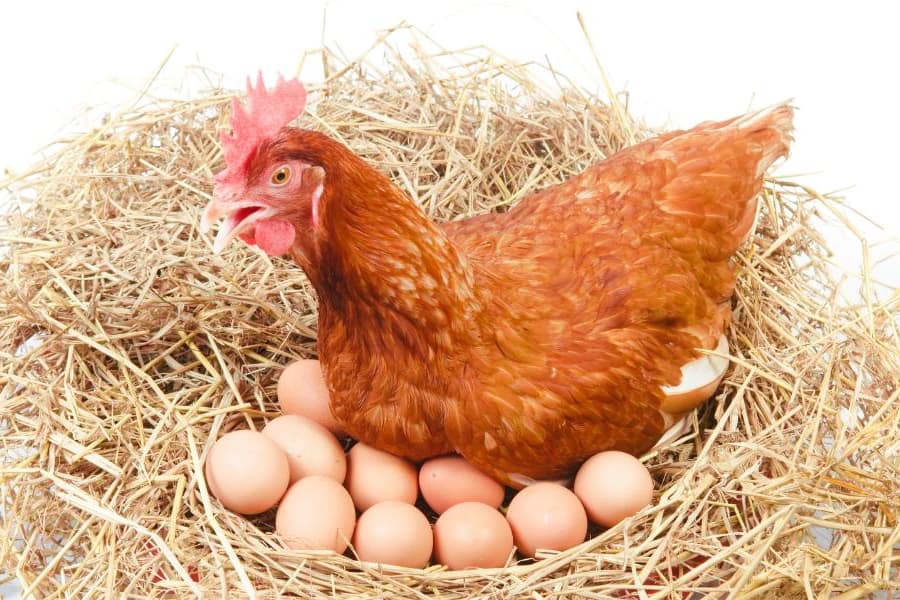Learn about broody chickens, their behavior, and how to care for them effectively to ensure a healthy and productive flock.
Introduction to Broody Chickens
Broody chickens are hens that naturally need to sit on and hatch eggs. This regular way of behaving is driven by their maternal impulse, driving them to remain a home for broadened periods. Understanding broody chickens is fundamental for any poultry guardian, as it can influence egg creation and the general well-being of the group.
At the point when a hen becomes broody, she will invest a large portion of her energy in the settling box, frequently declining to leave in any event, for food and water. Overseeing broody chickens appropriately guarantees they stay solid and useful, and knowing how to one or the other help or deter this conduct can help your whole run.
Definition of Broody Behavior
Broody chickens display explicit ways of behaving that signal their longing to incubate eggs. These hens will sit in the home the entire day, puff up their quills, and once in a while become forceful whenever upset. One more obvious indicator of broody chickens is the unmistakable clicking clamors they make while at home.
They may likewise cull feathers from their chest to make an exposed fix that assists keep the eggs warming. Perceiving these signs early can assist you with choosing how to deal with your broody chickens really, guaranteeing they don’t experience the ill effects of delayed dormancy or wholesome lacks.
Common Breeds Prone to Broodiness
Certain types of chickens are more inclined to broodiness than others. Broody chickens are ordinarily found among breeds like Silkies, Cochins, and Orpingtons, known for major areas of strength for their impulses. These varieties have been reared generally for their capacity to bring forth and raise chicks, making them incredible normal hatcheries.
If you are thinking about raising broody chickens, these varieties are an extraordinary decision because of their dependability and commitment to agonizing. Nonetheless, assuming that your objective is consistent egg creation, you should choose breeds less inclined to become broody.
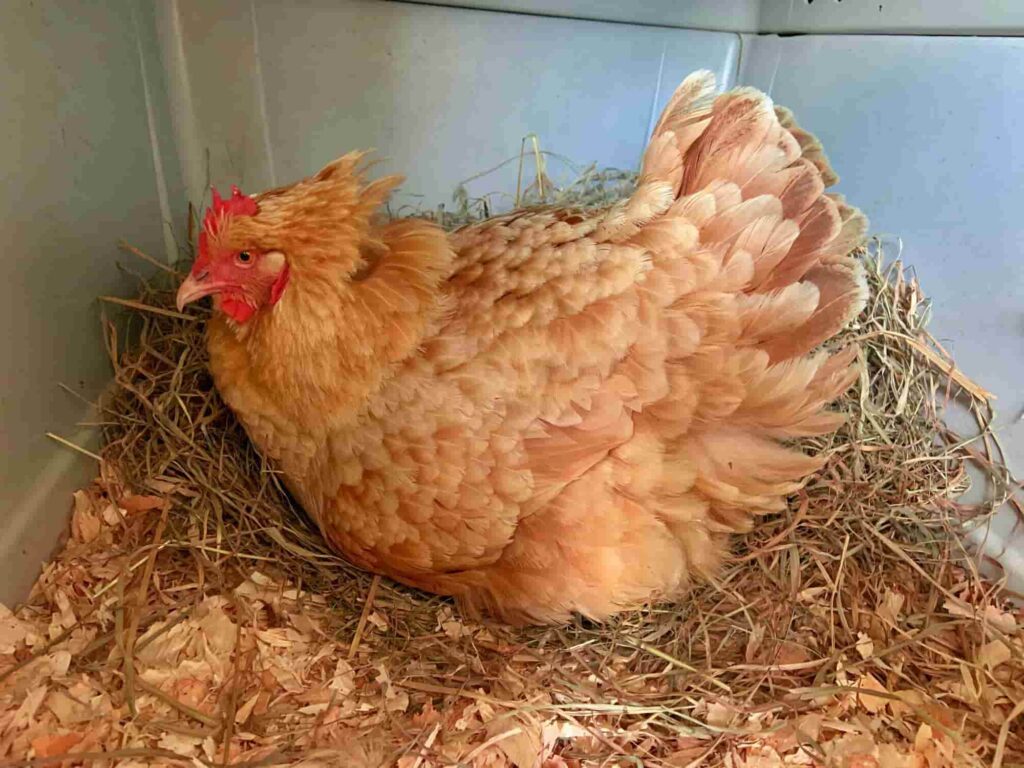
Natural vs. Induced Broodiness
Broody chickens can show broodiness normally because of their hereditary qualities and ecological variables. A warm climate, happy with settling regions, and the presence of eggs can normally set off broodiness in powerless varieties. Notwithstanding, broodiness can likewise be incited purposefully if you believe a hen should incubate eggs.
This should be possible by leaving a grip of eggs in the home or utilizing counterfeit strategies to empower the way of behaving. Understanding the contrast between normal and actuated broodiness helps in overseeing broody chickens all the more actually, guaranteeing you can either advance or deter this conduct in light of your group’s necessities.
Identifying Broody Behavior
Distinguishing broody conduct in chickens is significant for dealing with your herd. Broody chickens show a powerful urge to sit on eggs and portal them, frequently remaining in the home for quite a long time. They show a defensive demeanor towards their home, once in a while becoming forceful whenever drawn closer.
Perceiving these ways of behaving assists you with understanding when your hens are becoming broody chickens, permitting you to settle on the best strategy. Overseeing broody chickens appropriately guarantees they stay sound and useful. Early distinguishing proof is vital to giving fitting consideration to broody chickens, guaranteeing their prosperity.
Signs and Symptoms of Broodiness
The signs and side effects of broodiness in chickens are very unmistakable. Broody chickens will remain in the home practically constantly, just leaving momentarily to eat and drink. These hens frequently puff up their plumes and make special clacking sounds when drawn nearer. One more indication of broody chickens is their hesitance to leave the home, regardless of whether you attempt to move them.
They may likewise turn out to be more regional, pecking at anybody who approaches. Recognizing these signs early aids in overseeing broody chickens successfully, guaranteeing they get the consideration they need without upsetting the remainder of your herd.
Behavioral Changes
Conduct changes in broody chickens are not difficult to recognize once you know what to search for. A broody hen will remain in the home, some of the time declining to leave in any event, for food or water. She will puff up her quills to seem bigger and scary, a characteristic guard system. Broody chickens additionally make particular, low-cackling commotions, not quite the same as their typical sounds.
These hens could likewise turn out to be more forceful, pecking at anybody who moves toward their home. Perceiving these conduct changes is essential for overseeing broody chickens and guaranteeing they stay solid and cheerful.
Physical Changes
Actual changes in broody chickens are one more mark of their broody state. One recognizable change is the deficiency of quills on the bosom, which the hen calls to make a warm, exposed fix for hatching eggs. Broody chickens may likewise show up more lightened up and bigger because of their puffed-up feathers.
Also, these hens frequently look not so much dynamic but rather more dormant because they invest such a lot of energy sitting in the home. Noticing these actual changes can assist you with distinguishing broody chickens early and give the fundamental consideration to guarantee their well-being and prosperity during the agonizing time frame.
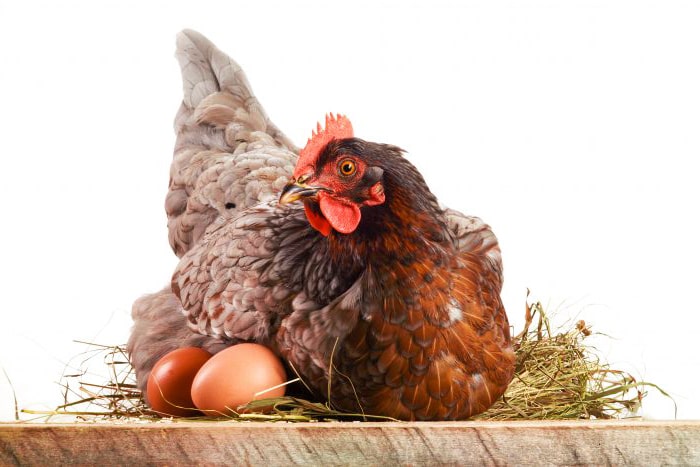
Causes of Broodiness
The reasons for broodiness in chickens are impacted by a few factors that trigger their maternal senses. Understanding what causes broody chickens can assist you in dealing with your herd all the more successfully. Hormonal changes, natural factors, and breed-explicit propensities all assume a part in making hens broody.
Perceiving these causes permits you to expect and oversee broody chickens better. Knowing why chickens become broody assists in furnishing them with appropriate care and guaranteeing their well-being and efficiency. By understanding the reasons for broodiness, you can establish a more adjusted and amicable climate for your herd.
Hormonal Changes
Hormonal changes are an essential driver of broodiness in chickens. These progressions trigger the maternal impulses in broody chickens, making them need to sit on and hatch eggs. The arrival of explicit chemicals makes hens show ways of behaving common of broody chickens, for example, remaining in the home and puffing up their quills.
These hormonal movements are much of the time affected by the presence of eggs and the hen’s natural clock. Understanding what hormonal changes mean for broody chickens can assist you with dealing with their way of behaving and guarantee they stay sound and useful. Dealing with these progressions is vital to really focusing on broody chickens successfully.
Environmental Factors
Ecological variables play a huge part in causing broodiness in chickens. A warm climate, agreeable home box conditions, and the presence of eggs can all set off a broody way of behaving. Broody chickens frequently answer their environmental factors, making it vital to establish a climate that either deters or supports broodiness, contingent upon your requirements.
Guaranteeing the right circumstances can assist with overseeing broody chickens and forestall undesirable broodiness. By understanding what natural variables mean for broody chickens, you can make a more controlled and useful poultry climate. Dealing with these variables helps in keeping up with the well-being and prosperity of broody chickens.
Breed-Specific Tendencies
Certain varieties have a characteristic propensity towards broodiness more than others. Breeds like Silkies, Cochins, and Orpingtons are known for being broody chickens because of their solid maternal impulses. This variety of explicit inclinations makes them brilliant for incubating eggs however can be a test if nonstop egg creation is wanted.
Understanding which breeds are inclined to become broody chickens can assist you with settling on informed choices while picking your group. Overseeing breed-explicit propensities is pivotal for keeping a reasonable and useful group. Realizing these inclinations takes into consideration better preparation and care for broody chickens.
Managing a Broody Hen
Dealing with a broody hen is a vital part of poultry keeping. Broody chickens require exceptional consideration and regard to guarantee their well-being and efficiency. At the point when a hen becomes broody, she commits herself to sitting on eggs, which can influence her general prosperity if not overseen as expected.
Choosing how to deal with broody chickens includes figuring out their necessities and the effect on your group. Whether you decide to break the broodiness or permit it, knowing the right strategies is vital to give a fitting climate. Overseeing broody chickens successfully keeps a sound and useful herd.
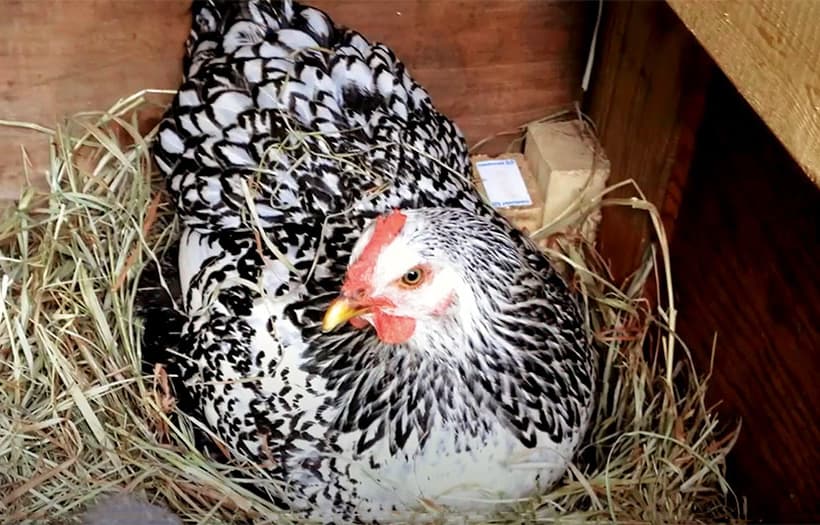
Deciding Whether to Break Broodiness or Allow It
Choosing whether to break a hen’s broodiness or permit it is a significant choice for any poultry guardian. Broody chickens can either be urged to incubate eggs or be deterred from remaining at home. Permitting broodiness can be advantageous if you need more chicks, yet it can diminish egg creation.
Then again, breaking broodiness guarantees the hen gets back to laying eggs sooner. Understanding the advantages and disadvantages helps in coming to an educated conclusion about overseeing broody chickens. This choice influences the general elements and efficiency of your herd, making it significant to painstakingly gauge your choices.
Techniques for Breaking Broodiness
There are a few successful strategies for breaking broodiness in hens. One normal strategy is to eliminate broody chickens from the home over and over, putting their settling conduct down. Cool showers can likewise help, as bringing down the hen’s internal heat level can diminish the hormonal drive to remain broody.
Another strategy is to put the hen in a wire-lined confine, which makes it self-conscious to sit in one spot for a long time. Utilizing these strategies can assist with overseeing broody chickens and return them once again to ordinary egg-laying. It’s essential to be delicate and reliable to guarantee the hen’s well-being and prosperity during this cycle.
Establishing a Protected Agonizing Climate if Permitting Broodiness
On the off chance that you choose to permit broodiness, it is fundamental to establish a protected agonizing climate. Broody chickens need a tranquil, secure put to sit on their eggs without unsettling influence. Guarantee the home box is agreeable and gives simple admittance to food and water. It’s likewise critical to beware of the hen routinely to screen her well-being and the state of the eggs.
A very much kept-up-agonizing climate upholds the hen’s normal impulses and guarantees fruitful incubating. By giving the right circumstances, you can oversee broody chickens actually and support their part in raising new chicks.
Caring for a Broody Hen
Focusing on a broody hen includes meeting her special requirements during this period. Broody chickens devote themselves to sitting on eggs, frequently to the impairment of their wellbeing. Guaranteeing that your broody hen approaches food and water, an agreeable and safe climate, and normal well-being checks is urgent.
Legitimate consideration keeps up with the well-being and prosperity of broody chickens, guaranteeing they can effectively incubate eggs and return to their normal routine subsequently. By zeroing in on these areas, you can successfully focus on your broody hen and back to her normal impulses.
Providing Food and Water Access
Broody chickens frequently disregard their requirements, making it fundamental to give simple admittance to food and water. Place food and water dishes near the home so the hen can eat and drink without leaving her eggs for a long time. High-protein feed and new water are significant for keeping up with her well-being during this requesting period.
Guaranteeing broody chickens approach sustenance assists them with remaining solid and sound. Routinely check that the food and water are spotless and renewed to help the hen’s prosperity. Legitimate sustenance is fundamental for broody chickens to incubate their eggs effectively.
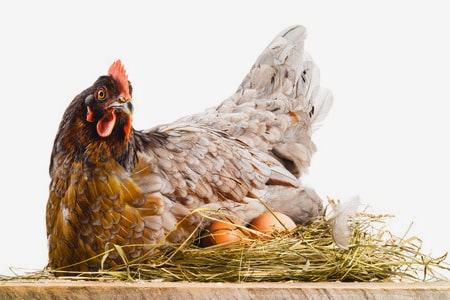
Ensuring Comfort and Safety
Establishing an agreeable and safe climate for your broody hen is fundamental. Broody chickens need a tranquil, secure home box where they feel safeguarded. Guarantee the home is spotless, dry, and liberated from unsettling influences. Give delicate sheet material to keep the eggs warm and the hen agreeable.
Security is additionally significant; keep the home box away from hunters and different hens that could upset the broody hen. A much-kept-up climate assists broody chickens with remaining even-tempered and zeroed in on their eggs, expanding the possibilities of fruitful bring forth. Solace and wellbeing are key parts of really focusing on broody chickens.
Monitoring Health
Consistently checking the soundness of your broody hen is essential during this period. Broody chickens are in danger of medical problems, for example, parasites and hunger because of their delayed idleness. Look at the hen for indications of parasites, and guarantee she is eating and drinking sufficiently. Search for any indications of disease or misery, and make a move if necessary.
Giving them a decent eating routine with extra nutrients and minerals can assist with keeping up with their well-being. Checking the soundness of broody chickens guarantees they stay solid and fit for incubating their eggs effectively. Ordinary well-being checks are an indispensable piece of really focusing on broody chickens.
Hatching Eggs
Incubating eggs under a broody hen can be a remunerating experience, however, it requires cautious preparation and tender loving care. Broody chickens are normally disposed to hatch eggs and raise chicks, making them ideal for this assignment.
To guarantee effective incubating, you’ll have to choose treated eggs, place them appropriately under the broody hen, and keep up with the right hatching conditions. Moreover, it’s vital to be ready for potential issues like non-practical eggs or hen deserting. By understanding these angles, you can oversee broody chickens and back the incubating system.
Selecting Fertilized Eggs
Choosing the right treated eggs is essential for effective incubating. Pick eggs from solid, vivacious hens and chickens to expand the possibilities of sound chicks. New eggs, ideally something like seven days old, are best for hatching. While overseeing broody chickens, guarantee the eggs are perfect however try not to wash them, as this can eliminate the defensive sprout.
Investigate each egg for breaks or imperfections before setting them under the broody hen. By choosing excellently prepared eggs, you set the establishment for fruitful incubating and sound chicks.
Putting Eggs Under the Broody Hen
Appropriately putting eggs under the broody hen is fundamental for compelling hatching. Tenderly lift the hen and spot the chosen prepared eggs in the home, they are situated near one another to guarantee they. Broody chickens will normally orchestrate the eggs to boost warmth and contact.
It’s ideal to do this at night when the hen is quiet and bound to acknowledge the eggs. Screen the hen to guarantee she settles serenely over the eggs. The right arrangement assists broody chickens with keeping up with ideal brooding circumstances and improves the probability of fruitful incubating.
Incubation Period and Conditions
The hatching time frame for chicken eggs is around 21 days. During this time, it is basic to keep up with the right circumstances. Broody chickens are incredible at directing temperature and dampness, however, it’s vital to guarantee they have a tranquil, undisturbed climate. Give new food and water close by so the hen can eat and drink without leaving the home for extensive stretches.
Check the eggs sometimes to guarantee they stay spotless and in salvageable shape. By supporting broody chickens with ideal brooding circumstances, you assist with guaranteeing a sound turn of events and effective incubating of the chicks.
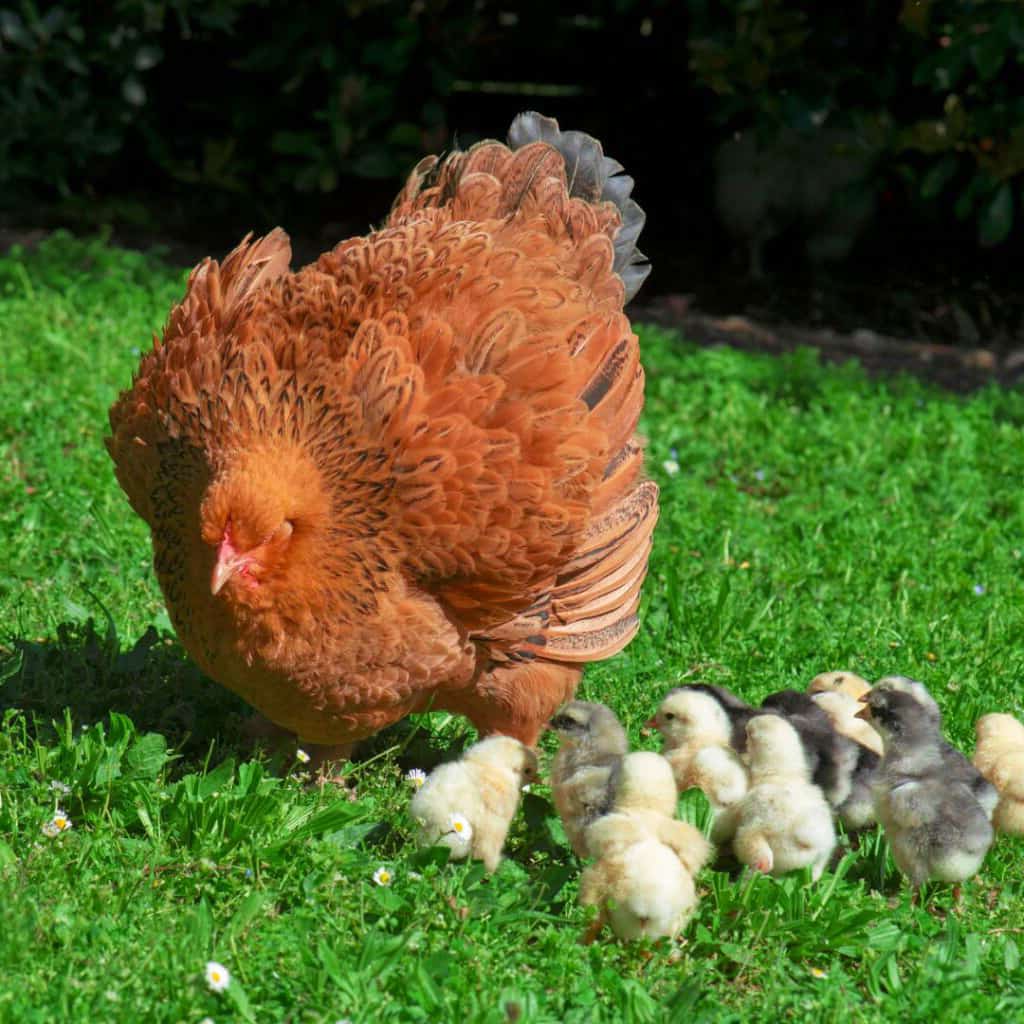
Handling Potential Problems
Possible issues during the incubating system incorporate non-feasible eggs and hen deserting. Non-feasible eggs may not grow as expected or may quit creating sooner or later. Candling the eggs around days 7 and 14 can assist you with distinguishing any that are not creating and eliminating them to forestall pollution. Hen surrender can happen assuming the broody hen loses interest or feels compromised.
Assuming this occurs, you might have to utilize a hatchery to wrap up incubating the eggs. Being ready to deal with these issues guarantees broody chickens and their eggs have the most obvious opportunity for fruitful incubating.
Potential Problems and Solutions
Overseeing broody chickens can accompany different difficulties, including well-being and social issues, as well as overseeing connections with non-broody hens. Understanding these likely issues and knowing how to address them is urgent for keeping a solid and amicable group.
Medical problems like drying out and lack of healthy sustenance, social issues like hostility and delayed broodiness, and managing non-broody hens all require explicit methodologies. By being prepared and proactive, you can effectively direct broody chickens and assure the success of your entire rush.
Health Issues (e.g., Dehydration, Malnutrition)
Clinical issues, for instance, parchedness and awfulness are typical in broody chickens, as they habitually ignore their necessities while sitting in the home. To forestall parchedness, place new water inside the simple reach of the broody hen. Giving excellent feed that is rich in protein and supplements is fundamental to forestall ailing health.
You might have to urge the hen to leave the home momentarily to eat and drink. Consistently look at the hen’s condition to guarantee she keeps a solid weight and hydration level. Tending to these medical problems expeditiously guarantees broody chickens stay solid all through the agonizing time frame.
Behavioral Issues (e.g., Aggression, Prolonged Broodiness)
Conduct issues, for example, animosity and delayed broodiness can happen in broody chickens. A broody hen might become forceful towards different chickens and even people, shielding her home energetically. To oversee hostility, give a different, calm space for the broody hen where she won’t feel undermined. Delayed broodiness, where a hen stays broody past the ordinary hatching period, can prompt medical conditions.
To address delayed broodiness, you can attempt procedures like eliminating the hen from the home or utilizing a broody breaker confine. Dealing with these conduct issues keeps up with agreement and the well-being of broody chickens.
Dealing with Non-Broody Hens in the Same Flock
Managing non-broody hens in similar herds as broody chickens can introduce difficulties. Non-broody hens might upset the broody hen or attempt to lay eggs in her home. To forestall this, give separate settling regions and guarantee the broody hen has a tranquil, confined space. Mark the eggs under the broody hen to distinguish them from any new ones laid by different hens.
This keeps everything under control and diminishes pressure for both broody and non-broody hens. By dealing with the communications between broody and non-broody chickens, you can establish a more agreeable and useful climate for your herd.
What is a broody chicken?
A broody hen is a female bird that wants to hatch eggs. Broody hens will track down an agreeable spot – generally a safe and little space like a settling box – to lay their grasp.
Is it okay to let a chicken be broody?
In warm climates, when the home boxes can become sweltering like a broiler, she can without much of a stretch become dried out. While she can keep this daily schedule awake for 21 days, it is no picnic for her. Permitting her to sit on eggs that won’t ever bring forth is ridiculous for her and not to anybody’s greatest advantage
Is it cruel to break a broody hen?
Once in a while hens will go broody at unusual times, such as throughout the colder time of year, too soon in the spring, or in the fall. In these cases, it’s ideal to break her of her broodiness to protect her wellbeing. Throughout the colder time of year, a chicken requires zero in the entirety of its energy to remain warm and sound, not being broody, and raising chicks.
Conclusion
In conclusion, overseeing broody chickens requires cautious thoughtfulness regarding their one-of-a-kind necessities and ways of behaving. Whether choosing to energize or beat broodiness down, giving the right consideration and climate is fundamental for their prosperity and the progress of incubating eggs. From choosing prepared eggs to checking well-being and resolving possible issues, each step assumes a pivotal part in supporting broody hens and guaranteeing the soundness of the whole run.
By grasping the reasons for broodiness, executing successful strategies for the executives, and being ready to address difficulties, poultry guardians can establish an amicable and useful climate for their broody chickens. With legitimate consideration and consideration, broody chickens can satisfy their regular impulses and add to the delight of raising solid chicks.
Read More
Can Chickens Eat Grapes? Nutritional Benefits and Safety Tips

